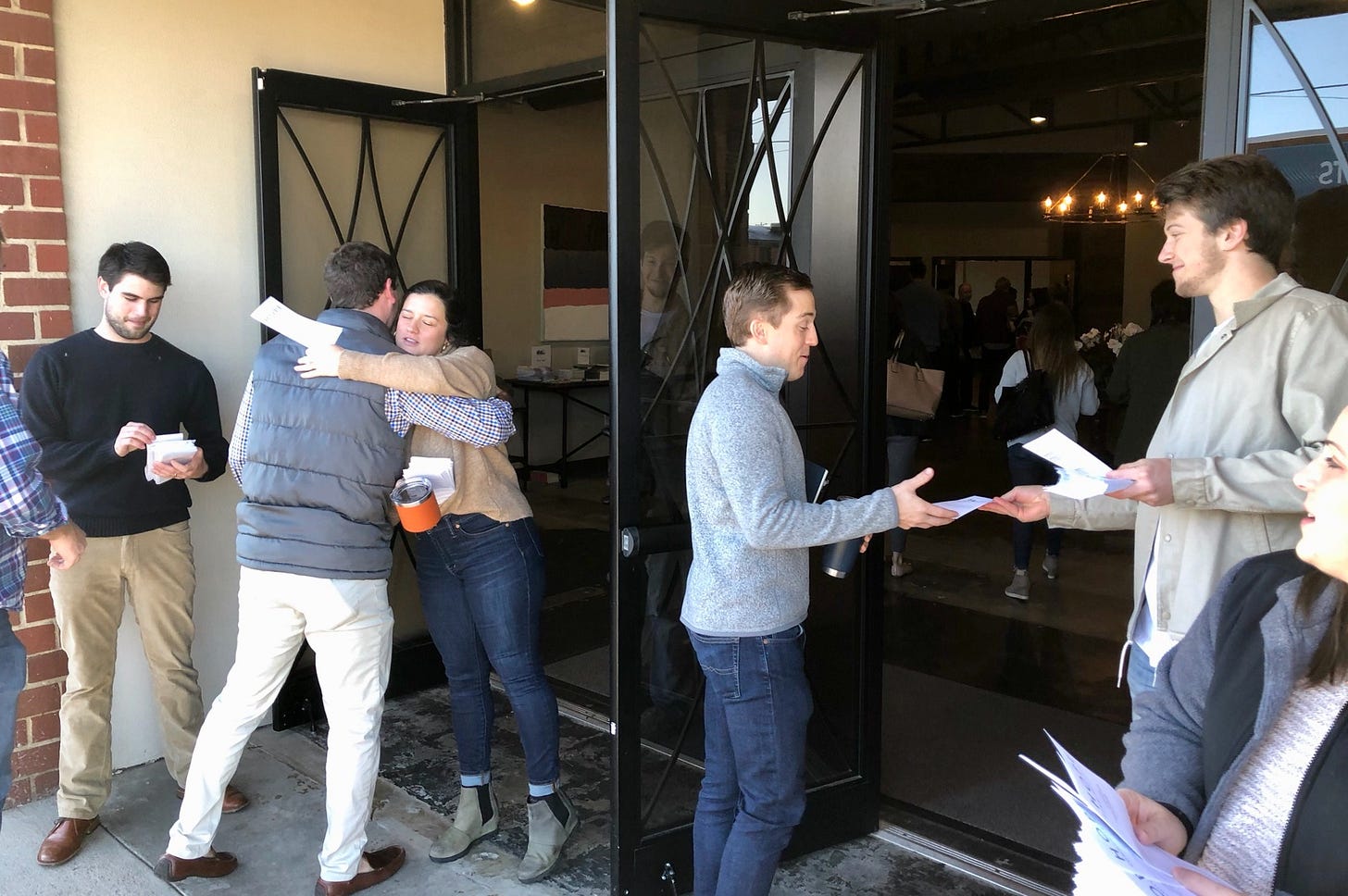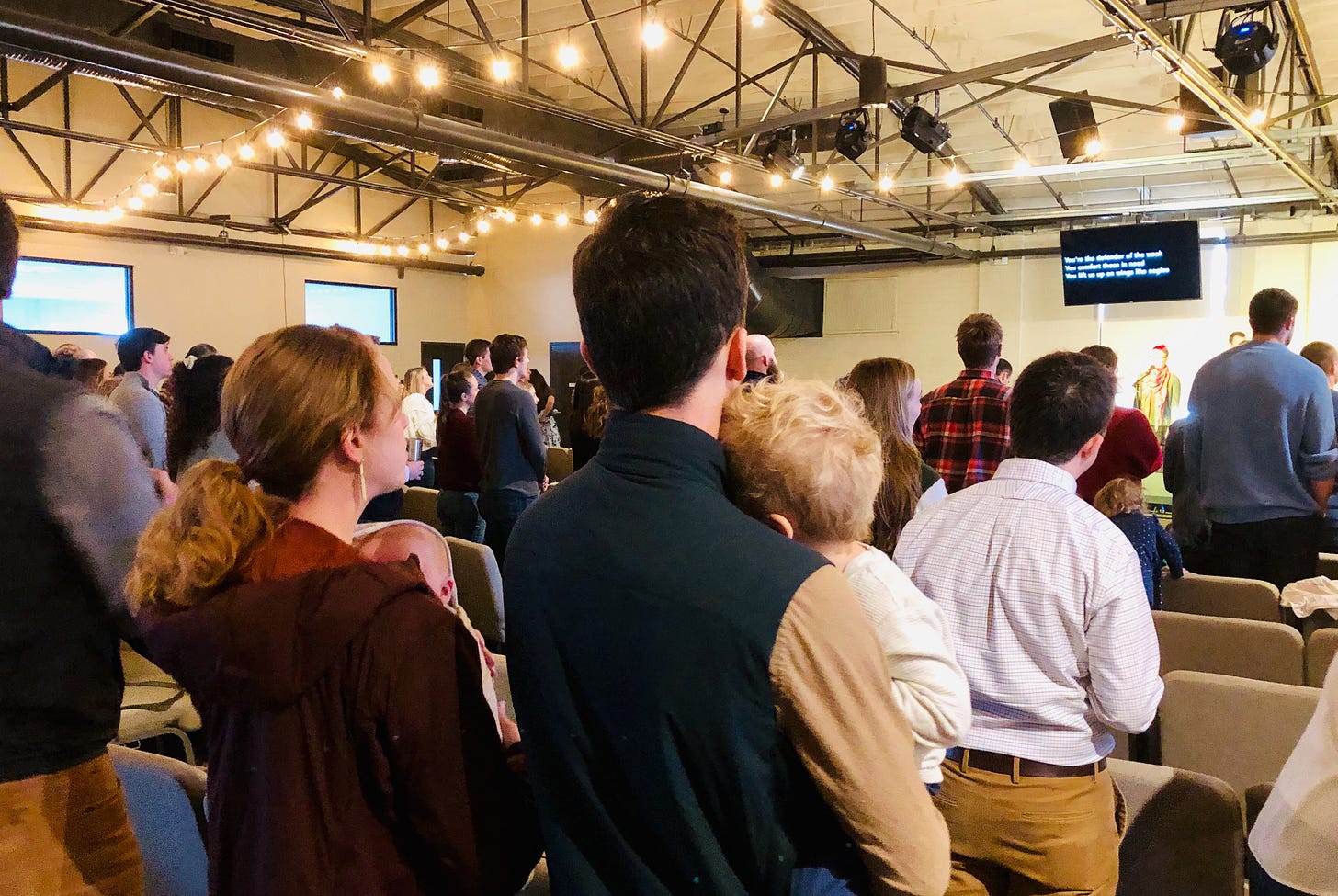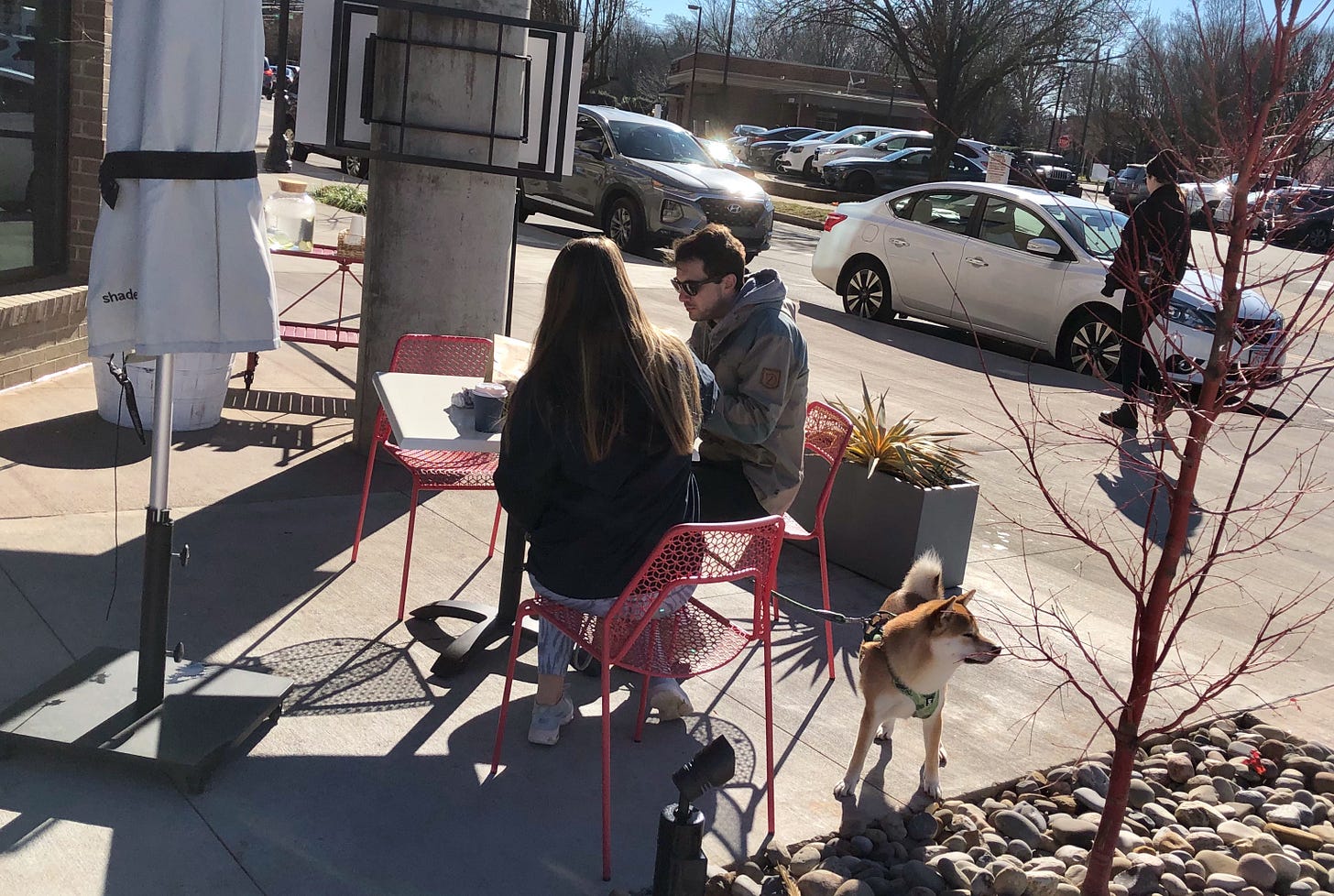On Sunday mornings, a choice in South End
Plus: Conventions start canceling on Charlotte over coronavirus; Hornets games with no fans?; Mortgage rates hit all-time low; How do *you* pronounce "Rama Road"?
Good morning! Today is Monday, March 9, 2020. You’re reading The Charlotte Ledger, an e-newsletter with local business-y news and insights for Charlotte, N.C.
Note: Starting this week, Wednesday and Friday editions of The Ledger are for paying subscribers only. A reasonable $9/month. Don’t miss out. Help build smart local news. Details here.
Today’s Ledger is sponsored by Blumenthal Performing Arts:

Presenting “An Evening with Ronan Farrow.” Join the Pulitzer Prize-winning investigative reporter on March 28 at Belk Theater as he dives into his new book “Catch and Kill: Lies, Spies, and a Conspiracy to Protect Predators.” Visit BlumenthalArts.org for tickets and information.
South End churches work to draw millennials into the pews, but it’s a tough sell; Free breakfasts, drive-thru coffee

Hope Community Church draws 700 worshippers at its two Sunday services in South End. It is one of about a dozen churches in the area trying to stay relevant among the growing number of millennials moving to Charlotte.
By Ken Garfield
It’s not too trite to say that the battle to win the souls of South End millennials comes down to a choice between two powerful forces: Bibles or Bloody Marys.
OK, it’s a little trite. But it’s a simple way to sum up a complex issue. Before you ask, South End millennials aren’t much different than 20- and 30-somethings elsewhere. There are just a lot of them in South End.
At last count, 7,000 of the 17,000 people occupying all those apartments around the light rail are millennials. And because of South End’s milieu, they face more options than millennials elsewhere: Attend one of the dozen or so neighborhood churches trying to remain relevant in this part of town. Or find joy, fellowship, a respite from life’s routine — sustenance in whatever form you take it — at your apartment gym, WeWork office or favorite brewery. South End is thick with all of them.
FYI, South End is thick with a lot of people. The area has nearly tripled in population in the last decade.
To explore faith among millennials in South End, I spent a crisp Sunday morning in February...
Worshipping at one church that has resonated with millennials
Chatting with non-churchgoers at two brunch spots.
Dodging bicyclists and joggers up early on the Rail Trail.
Here, with some context and a few other interviews, is what I found. Full disclosure, I’m 66:
Leaving the church: First, you should know that organized religion has big problems with millennials everywhere. One survey found that between high school and turning 30, 43% of once-active millennials drop out of regular church attendance. Why? Duke Divinity School’s Will Willimon says millennials tend to “gather” online, finding everything from jobs to love. Why get up early on a Sunday and trudge to church when you’re comfortable searching for what you seek on your phone or laptop?
Millennials tend to be suspicious of institutions, Willimon says. They loathe rules and procedures. Is any institution drowning in rules faster than the mainline church, with its boards, sessions and elders? If all that isn’t reason enough to avoid church, consider: To many 25-year-olds, the mainstream church’s seemingly endless war over homosexuality is laughable.
In South End, a few newer churches are succeeding in speaking to millennials. Others that have been in South End awhile are trying to redefine themselves. And lots of millennials are ignoring them both.
Hope Community Church opened in 2016 in an old warehouse on Griffith Street and now draws 700 for its two Sunday services. The morning I was there, I didn’t see anyone older than me. I saw more sneakers than ties. Coffee percolated in the narthex (church-ese for “lobby”). The music was guitar-driven. Babies abounded, including in the service. All that is routine for churches wooing millennials.

Sneakers, guitar music, babies, warm greetings: Worshippers at Hope Community Church in South End.
Making connections: What I found unique, and genuine, at Hope was a greeting time among worshippers that lasted several moments. There was a buzz in the room as people talked, really talked, truly connected. At traditional churches, I’ve seen greeting time end after 30 seconds of cold handshakes and cool “Good mornings.” Then pastor Aaron Ingle began his sermon by noting that Hope Community Church is intentionally inefficient. Love, he said, isn’t efficient. Jesus isn’t efficient. He, and we, operate at a different pace than those around us. That’s a good thing.
This is the life and language of millennials, says Hope’s pastor, Mark Upton. Vulnerability. A freedom to doubt. A hunger to share intimately: There are 48 small groups at Hope that meet to talk during the week in people’s homes. Support groups at Hope include one for those dealing with infertility and another for families who have adopted or fostered children. A table of reading material included a brochure on “Your Husband Is Addicted To Porn.”
I’ve witnessed the flip side of all that: Denominations that say their way is the only way. Pastors with an arrogance bordering on narcissism, insisting they alone have The Answer. Churches that profess to welcome all but really don’t. If you’re 30 and returning to the church or trying church for the first time, what will resonate? Vulnerability or arrogance?
Genuine connections, coffee run: Like so many his age, mechanical engineer James Banta, 32, quit attending church in college. His mom wasn’t there to make him go. Now he and his wife are drawn to Hope for more than cool music. “A community church,” he says, “is about knowing each other more than ‘How was your week?’ It’s more ‘How are you feeling?’” Speech therapist Steph Teran, 33, seconded that as she handed out worship bulletins. Worshipping in South End, though, does come with a perk: Between the 9 and 11 a.m. services, Steph walks over to The Suffolk Punch brewery/coffee bar/cafe for coffee.
Pritchard Memorial Baptist Church represents another side of the story.
Founded in 1901, Pritchard is that sprawling edifice behind the Dowd YMCA. A cool warehouse space this is not. After some decline, Sunday attendance has stabilized around 350, says pastor Bobby Morrow, as warm a pastor as you will meet. Sixty or so are millennials. That’s not enough to secure a future. And so Pritchard will launch a Saturday evening service in August. The 5 p.m. start will give worshippers a chance to go out afterward.
Free breakfast, Saturday service: Pritchard also hosts a Free Coffee Friday drive-through once a month, handing out coffee, biscuits and the like. It draws a good number of South End and Dilworth millennials. Some come on bike or foot since they work from home. Saturday services so you can sleep in Sunday. Free breakfast. “If you’re going to be around another 119 years,” Morrow says, “you have to reach more people.”
Grace Covenant Church at the corner of South and East boulevards is taking a different approach. The church isn’t targeting millennials, says pastor Chad Miller. Instead, it’s trying to reach all ages with its traditional style of worship. Millennials, says Miller, want a countercultural experience. What’s more countercultural than hymns and the Bible? “We’re going to be who we are and love everybody,” he says, adding, “You can meet me. I’m not hip.” Something’s clicking. Sunday attendance has grown from 60 to 100 or so in the past year. Sixty percent of guests and new attendees are millennials.
For all that churches are doing to win hearts and minds, a majority of all ages aren’t buying what they sell. A 2017 survey found that 38% of adults say they attend a religious service weekly or almost weekly. That means 62% don’t. Millennials lead the no-shows.
Leaning on friends: Teachers Allison Marrara and Molly Gillespie chose to spend Sunday morning sharing a meal at Eight + Sand on New Bern Street. Allison, 28, said she finds her support system in gathering with friends a couple of times a month. Molly, 28, says she’ll attend church with family when she goes home to Virginia for the weekend. But not so much here, among strangers. Molly isn’t alone among newcomers: 66% of South Enders moved here from another city.
Eating breakfast at a table outside Eight + Sand, engineers Chip Goodman and Emily Skibenes, both 25, said they don’t need church for fellowship. You meet people just walking around South End, Emily says.

Like a lot of people in their 20s, Chip Goodman and Emily Skibenes say they find fellowship in places outside of church. They were eating breakfast one recent Sunday morning at Eight + Sand.
If hanging out at churches, mosques and synagogues for the last 24 years has taught me anything, it’s this: We’re a lonely people. Our loneliness is deepened by the hours we spend in darkness brightened only by the glow of our phones. We work in a place for two years then move to the next place. We live in a neighborhood like South End for three years then move to another neighborhood.
Wherever we go, we wonder where we’ll find someone to talk to. It could be God. It could be the person beside us in church. It could be the kind soul we run into just walking around. Anyone with a listening heart will do.
Hope pastor Mark Upton’s question for South End churches, for all churches, is this: “Are you willing to talk to these people about what they’re struggling with? That’s the secret sauce.”
Ken Garfield spent 12 years as faith and values reporter at The Charlotte Observer and 12 as communications guy at Myers Park United Methodist Church. Now he’s a freelancer writing for charitable causes. He also writes obituaries. Reach him at garfieldken3129@gmail.com.
Have an opinion? You can comment on this article by clicking on the rectangular word bubble at the top or bottom of this post.
Window closing: Time to sign up for The Ledger
Four mornings a week, The Ledger is making you smarter about the city you live in. We’re telling you things you don’t know. We’re introducing you to trends before they’re obvious. We’re giving you thoughtful insights about the biggest issues facing Charlotte. We’re linking you with expertise on important topics — like religion and the growth of South End (above) — and we’re providing history and perspective and context that’s often overlooked by other local media. Let’s keep the momentum going. Here’s how you can help:
Spread the word. Tell people. Forward this email. Write a post on Facebook or LinkedIn that says, “I have been enjoying The Charlotte Ledger. Check it out!” and add a link.
Subscribe. Starting Wednesday, to continue receiving all editions of The Ledger, you’ll want a paid subscription. The regular rate is $9/month or $99/year, and there’s another tier that comes with up to six emails (collected after payment). It’s aimed at companies, groups and individuals who want to show support at a higher level. All the details are here.
Today’s supporting sponsors are TechnikOne:

… and T.R. Lawing Realty:

No international snackers: Conventions start bailing on Charlotte over coronavirus fears
Some conventions that were scheduled to head to Charlotte in the next month have been canceled because of fears about the coronavirus.
Of the four conventions in the next month listed on the Charlotte Convention Center’s event website, two have posted notices that they are bagging coming to Charlotte.
It’s a no-go for Snaxpo20, “the most comprehensive event devoted exclusively to the international snack industry,” which was to be held March 22-24. Organizers decided to cancel and are looking at rescheduling later in the year. That means no presentations on “Innovative Cutting Solutions for Foreign Material in Today’s Potato Supply” or any other panels. The website lists more than 160 exhibitors.
Same for Electrification 2020, scheduled for April 6-9. Organizers hope to push it back to 2021. Gov. Roy Cooper and Duke Energy CEO Lynn Good were to have delivered keynote addresses.
Aviation schedulers and window coverers can’t stop/won’t stop: But there’s no stopping the National Business Aviation Association, which is holding its schedulers and dispatchers conference (“SDC2020”) in town this week. It says it is stepping up safety and sanitation measures and will record some of the sessions for people unable to attend.
Ditto for the International Window Coverings Expo scheduled for March 25-27. The leader of the trade show said in a note that exhibitors from China will not be attending and that convention registration is actually increasing.
Other conventions in April and later appear not to have made any moves to cancel.
Why it matters: The larger issue for Charlotte is how much these canceled conventions and new self-imposed limits on business travel are hurting the local hospitality industry and tourism tax revenue. You’ll recall that city leaders are banking on taxes on hotel rooms, prepared food and rental cars to help pay for a variety of public projects — like the $110M the city has set aside in connection with the new Major League Soccer team. There are a lot of other projects the city would like to dip into tourism taxes for, too. If concerns about the virus pass quickly, the numbers might not be more than a blip.
A spokeswoman with the Charlotte Regional Visitors Authority, the public agency that runs the convention center and promotes tourism, said she had no information on cancellations or the potential effect on the CRVA. In response to questions from The Ledger, she said it is a “very dynamic situation” and that the CRVA is “navigating this evolving situation with each of our customers on a case-by-case basis.”
In other local coronavirus news…
Prepping for virtual instruction at UNCC: Instructors at UNC Charlotte have been directed that they “should begin planning for the possibility of delivering the remainder of their spring courses virtually,” according to a memo from Provost Joan Lorden obtained by The Ledger.
CMS limits travel: “CMS Cancels International Trips, Limits Staff Travel Because Of Coronavirus” (WFAE)
At the airport: “American Airlines, Charlotte airport announce plans to protect against the coronavirus” Spoiler alert: They’re doing more cleaning. (Observer)
Hornets games with no fans? The NBA has told teams to prepare for the possibility of playing basketball games with no fans in attendance. The joke on social media: “The Hornets have been training months for this.” (Bleacher Report)
All-time low mortgage rates: time to refinance?

Average mortgage rates on a 30-year mortgage hit an all-time low last week, at 3.29%. “Mortgage companies across the country are experiencing a surge in mortgage demand unlike any they’ve ever seen before,” Housing Wire reported. (Source: Freddie Mac)
In brief:
Plaza-Midwood purchase: Global investment manager Nuveen Real Estate and mixed-use developer Crosland Southeast announced Friday that they have bought the 12-acre site at Central and Pecan avenues in the middle of Plaza-Midwood and intend to develop it as a “pedestrian-friendly development that will foster connectivity and reflect the neighborhood’s distinct character.” They said it will include “neighborhood retail” and restaurants, creative office space, “differentiated residential units” and “intentional public gathering spaces.” No purchase price was disclosed, and public records on the sale were not immediately available. The Ledger first broke the news in September that the land was for sale, and Charlotte Agenda was first to report last month that it was under contract.
Meritorious achievement: Three students from Myers Park High have won the Morehead-Cain scholarship to UNC Chapel Hill, the school said on its Facebook page on Friday. That’s a lot for a single school. Last year, there were only 35 in all of N.C. and just six from Mecklenburg County. It’s a merit scholarship that provides a free ride to Carolina. Winners were informed last week, and the full list is not yet available.
Historic designation debate: Some Oaklawn Park residents say they oppose declaring the neighborhood a historic district, an effort The Ledger first reported last month. The vice president of the neighborhood association said he worries that “a historical designation will increase the costs residents pay to renovate their homes, placing an undue burden on seniors” and that he is “philosophically opposed to seeking outside permission before making improvements to his property.” The designation would cover about 227 houses and would be the city’s seventh historic district. The City Council will decide in the next few months. (QCityMetro)
You say Ram-uh, I say Ray-ma: Discussion breaks out on Charlotte Twitter over the weekend about the correct pronunciations of “Rama Road” and “McClintock Middle School,” with Queen City Nerve editor Ryan Pitkin and school board member Elyse Dashew weighing in. Where do you stand? (Twitter)
Taking stock
Unless you are a day trader, checking your stocks daily is unhealthy. So how about weekly? How local stocks of note fared last week (through Friday’s close), and year to date:

Need to sign up for this e-newsletter? Here you go:
Got a news tip? Think we missed something? Drop me a line at editor@cltledger.com and let me know.
Like what we are doing? Feel free to forward this along and to tell a friend.
Archives available at https://charlotteledger.substack.com/archive.
On Twitter: @cltledger
Sponsorship information: email editor@cltledger.com.
The Charlotte Ledger is an e-newsletter and web site publishing timely, informative, and interesting local business news and analysis Mondays, Wednesdays, Fridays and Saturdays, except holidays and as noted. Wednesday and Friday editions are for paying subscribers only.
We strive for fairness and accuracy and will correct all known errors. The content reflects the independent editorial judgment of The Charlotte Ledger. Any advertising, paid marketing, or sponsored content will be clearly labeled.
The Charlotte Ledger is published by Tony Mecia, an award-winning former Charlotte Observer business reporter and editor. He lives in Charlotte with his wife and three children.



How can churches draw more young people? Or is it a lost cause?